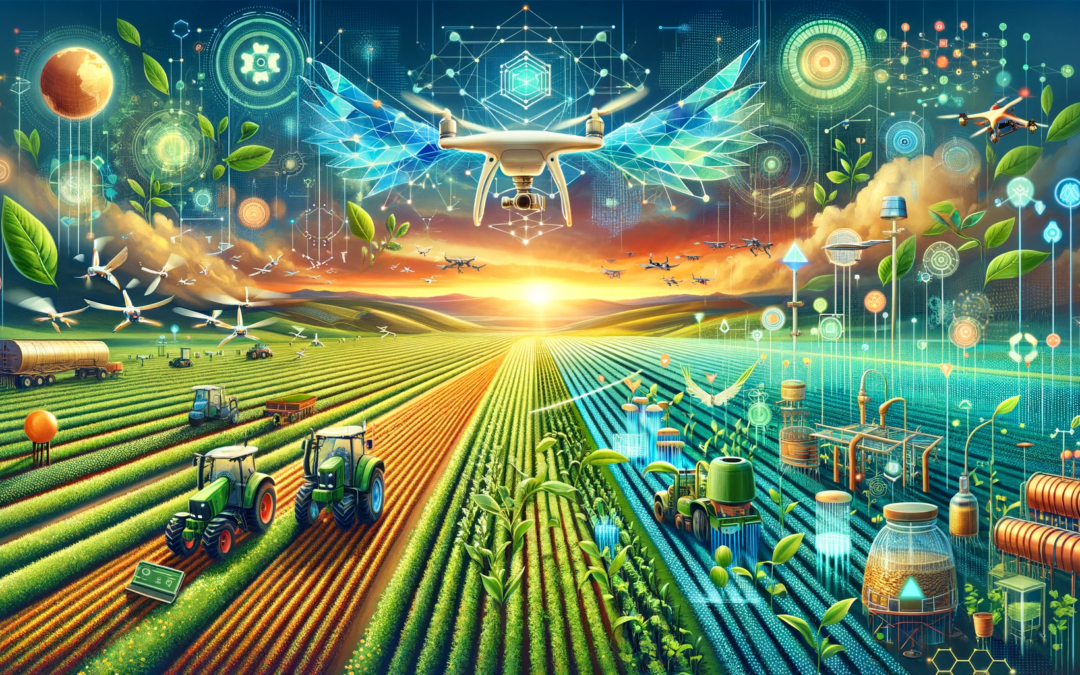Modern agriculture faces numerous challenges, from resource management and environmental impact to the need for sustainable practices. However, with the advent of AI, a transformative tool has emerged that is revolutionizing the agricultural landscape. In this blog post, we will explore how AI technologies are not only optimizing farming practices for increased efficiency and yield but also contributing to sustainable and environmentally friendly agricultural methods.
AI in Precision Farming
One of the key areas where AI is making a significant impact is precision farming. By leveraging AI-powered technologies, farmers can enhance their techniques for soil and crop analysis, pest and disease prediction, and even automate farming equipment. For example, AI algorithms can analyze soil samples and provide real-time recommendations for optimal fertilizer application, resulting in more efficient resource utilization and reduced environmental impact.
AI in Resource Optimization
AI is also playing a crucial role in optimizing resource use in agriculture. Water management, fertilizer application, and energy efficiency are all areas where AI can make a difference. By analyzing data from sensors and weather forecasts, AI algorithms can optimize irrigation schedules, reducing water waste and ensuring crops receive the right amount of moisture. Similarly, AI can calculate precise fertilizer requirements based on crop needs, minimizing excess usage and potential pollution.
AI in Crop Monitoring and Management
Real-time crop monitoring, yield prediction, and effective crop management strategies are essential for sustainable agriculture. AI tools are enabling farmers to achieve these goals more efficiently. With the help of AI, farmers can monitor crops remotely, identify signs of stress or disease early on, and take preventive measures. AI algorithms can also analyze historical data and environmental factors to predict crop yields, allowing farmers to optimize harvesting and minimize waste.
AI in Sustainable Agriculture
AI’s contribution to sustainable agriculture goes beyond optimizing farming practices. It also focuses on ecological balance, biodiversity protection, and reducing the carbon footprint of farming. AI-driven projects are being developed to monitor and protect wildlife habitats, promote pollinator populations, and enhance soil health. By harnessing the power of AI, farmers can adopt more sustainable practices that benefit both the environment and their long-term productivity.
Challenges and Ethical Considerations
While AI offers tremendous potential in agriculture, there are also challenges and ethical considerations to address. Data privacy, the impact on traditional farming communities, and technology accessibility are all important factors to consider. It is crucial to ensure responsible and inclusive AI integration in agriculture, taking into account the concerns and needs of all stakeholders involved.
The Future of AI in Agriculture
Looking ahead, the future of AI in agriculture holds even more promise. As technology continues to advance, we can expect further transformative advancements in precision farming and sustainability. However, it is essential to ask critical questions about the long-term implications of AI in the agricultural sector. How will it shape our food systems? What are the potential risks and benefits? These questions will guide the responsible development and implementation of AI in agriculture.
Engaging with the Audience
We invite you, our readers, to share your thoughts and experiences with AI-driven agriculture and sustainable farming. Join the discussion about the potential benefits and limitations of AI in agriculture. Together, let’s explore how we can leverage AI to cultivate a future that is both technologically advanced and environmentally sustainable.
Conclusion
AI is reshaping agriculture, offering unprecedented opportunities to optimize farming practices and promote sustainability. By combining technological innovation with ecological and social responsibility, we can cultivate a future where precision agriculture and sustainable food production go hand in hand. Let us embrace this transformative tool and pave the way for a more efficient, resilient, and environmentally friendly agricultural sector.
Visual Elements
Images and graphics can help illustrate the impact of AI on modernizing and enhancing agricultural efficiency and sustainability. Showcase AI applications in agriculture, such as smart farming systems, resource optimization tools, and sustainable farming practices. Infographics can be used to visually represent the benefits of AI in precision farming, resource optimization, crop monitoring, and sustainable agriculture.
SEO Elements
Keywords: AI in agriculture, precision farming with AI, sustainable agriculture and AI
Meta description: Explore how AI is shaping the future of agriculture, enhancing precision farming techniques, optimizing resource utilization, and promoting sustainable practices for a greener and more efficient agricultural sector.










